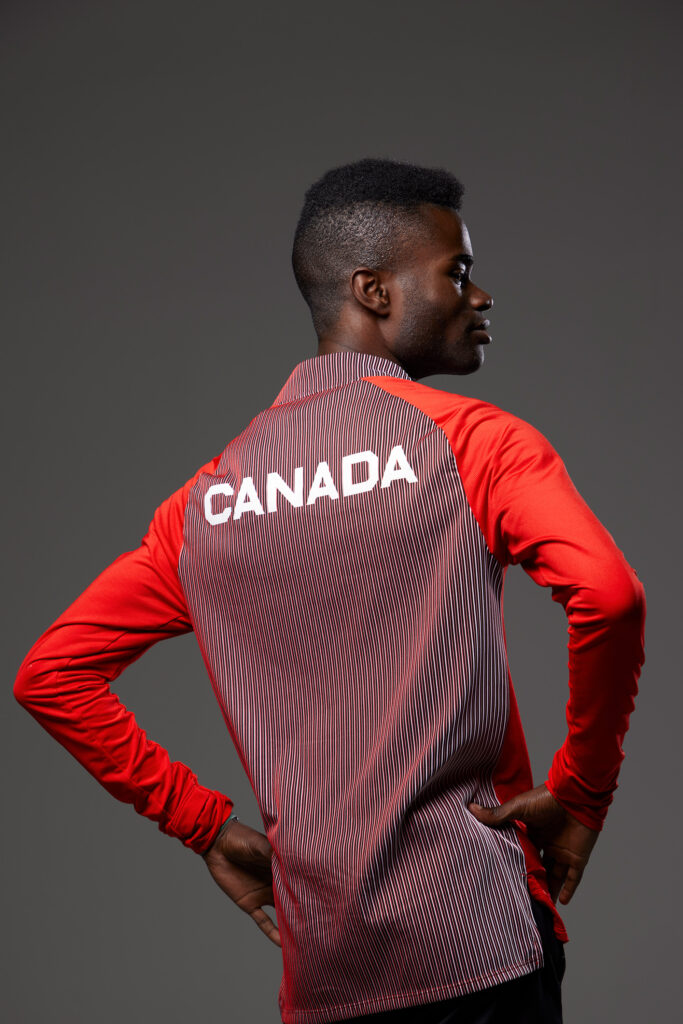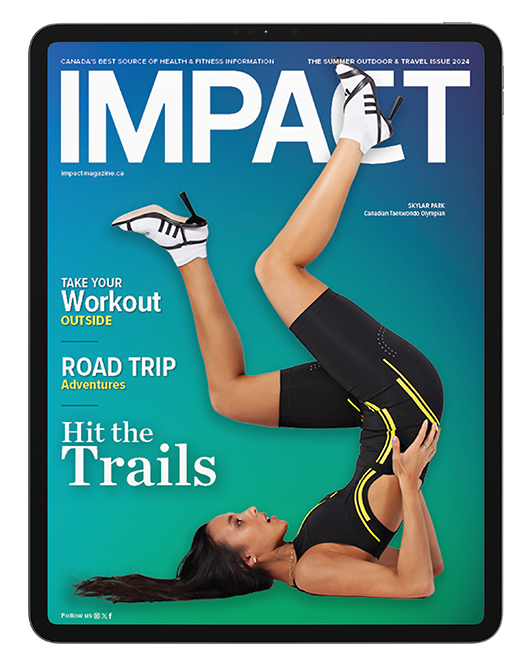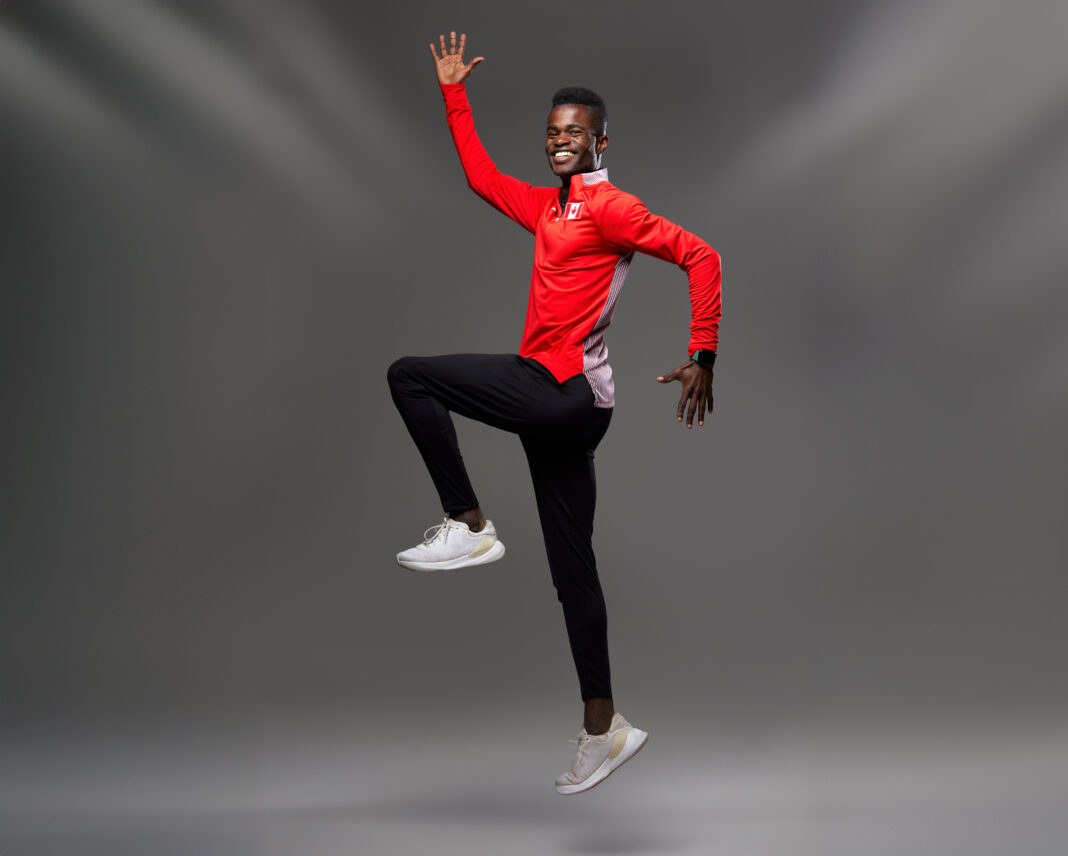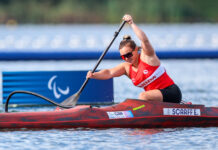A leap over garbage cans set in motion long jumper Noah Vucsics’s journey to make history: To become the first Canadian track and field athlete with an intellectual impairment to compete in the Paralympics.
The teacher who witnessed Vucsics’s propitious jump at his Calgary high school in 2018 suggested the grade 12 student try out for the track and field team. After just six weeks of training, Vucsics competed in his first–and only–high school city sports championship. He made a 20-foot jump, earning him a bronze medal.
I want to do what might seem impossible to others and inspire them—to show them what is possible.
Noah Vucsics
Vucsics’s podium finish wasn’t the first time he’d outperformed expectations. Born in Haiti, he was adopted at five months of age into the Vucsics family. As a child, the now 24-year-old was diagnosed with an intellectual disability that affected his reading and writing. He was placed in a special education program in his high school, one that frequently, in its attempt to help participants, kept them from mingling with their peers in the standard program.
Resisting the imposed isolation, Vucsics lobbied to be part of the core high school community. He received permission to audition for and take part in a production of Peter Pan; he joined leadership groups; and he practiced public speaking at events like talent shows. In 2018, he was chosen as class valedictorian, becoming the first student from a special education program at his high school to hold the convocation honour.
“I wanted to be involved and feel a part of the school,” he says. “I made it my mission to seek opportunities and get involved.”
It was only after graduation, while training with Calgary Track and Field Athletic Association, that he learned there is a class (T20) in para-athletics for people with intellectual disabilities. To compete, he would need to be classified internationally to verify his skill and competence, as well as prove his disability. In early 2020, Vucsics was preparing to travel to Dubai for the first step of the two-pronged classification process when the COVID-19 pandemic interrupted plans. His classification was delayed for two years, which meant he could not qualify for the 2020 Tokyo Olympics.
Vucsics, now officially classified, believes the delay was not a setback but an advantage.
“I was not ready to play for a medal in 2021,” he says, noting long jumpers usually peak at around 28 years of age. “Now I’m on a much higher level, physically and mentally, and ready to go to Paris and compete for a medal.”
Since becoming classified, Vucsics has participated in two major international competitions, earning a silver medal at the World Athletics Championships in Paris and a bronze in the Parapan American Games in Chile, both in 2023.

In Paris, he landed a jump of 735 centimetres, just five centimetres behind the gold medallist and current world record holder from Malaysia. His podium finish at the Worlds opened a qualifying spot for this year’s Paralympics in Paris—a spot he intends to fill. Vucsics is focused on September 7, 2024: the day of the Paralympic long jump final. “If I can fix the few things [I’ve been working on], then I can get from 735 centimetres to 750 centimetres and challenge for a medal,” he notes. Vucsics’s track journey has been relatively short, which he attributes to a lack of awareness about the Paralympics.
“When I discovered [long jump] and then discovered the intellectual impairment class, it really did change my life,” he says. And now he hopes to change the lives of others. In parallel with his track ambitions, Vucsics is striving to be an ambassador for people with intellectual disabilities. “There was a time when I thought, what good could come out of having an intellectual disability?” he explains. “I want to do things out of the norm to inspire others,” he adds, noting the support of his parents and older sister have been integral to his achievements.
Throughout his life, it’s frequently been suggested to him that certain things are out of reach. For example, it was recommended to him that he set his sights lower than the job he wanted—technician at the Apple Store. It took eight interviews, but Vucsics eventually earned the position and worked at Apple for three years before leaving to train full-time at the University of Calgary.
“I don’t want to settle,” he says.
Vucsics has begun speaking to schools and groups, telling his story to demonstrate all that is possible for people with disabilities when they are given opportunities to succeed. “We’re learning that IQ is a piece of paper. It doesn’t necessarily tell the whole story,” he explains. “I want to do what might seem impossible to others and inspire them—to show them what
is possible.”
Photography by Trudie Lee Photography
You may also like: Athletes with IMPACT

Read This Story in Our 2024 Summer Outdoor & Travel Issue
Featuring Canadian Taekwondo Olympian, Skylar Park. Must-visit adventure destinations across Canada. Your best trail running season ever with FAQs and threshold training plans. How (and why) gravel biking can rule your summer. Essential preparation to stay injury-free during hikes. Zero-waste your hiking and camping trips like a pro. Treat yourself with a Rustic Strawberry Chocolate Tart or Dairy-Free Vanilla Ice Cream, and so much more.
















